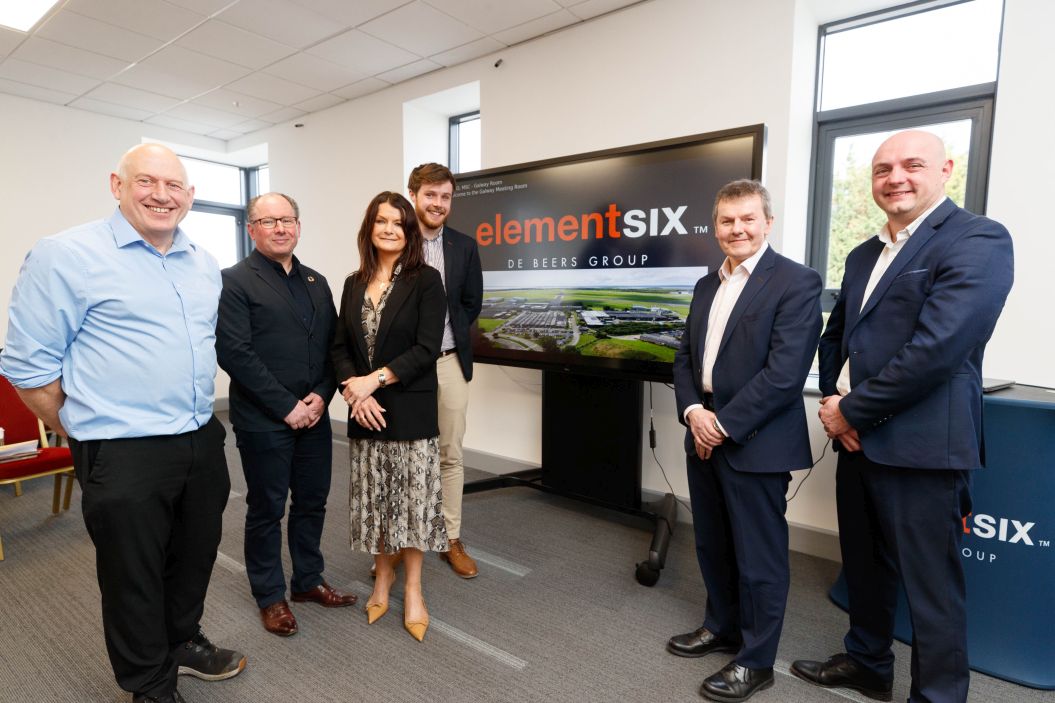
Sustainability focus is path to carbon neutrality for organisations
Helen Downes, CEO, Shannon Airport, pictured at the Mid-West Sustainability Network workshop held in Element Six with (from left): Richard Park, engineering manager, Element Six; Barry Gavin, network chair; Liam Morris, global CAaaS technical lead, Climeaction; Padraic McElwee, head of enterprise, LEO Clare; and Barry Bowen, industrial business lead, Climeaction. Photograph by Eamon Ward
Sustainability initiatives in an organisation are driven by people, planet, and profit. Members of Shannon Chamber’s Mid-West Sustainability Network substantiated this when they attended a recent workshop in Element Six in Shannon. When asked why their companies apply energy management and what drives energy management in their organisations, the predominant responses were cost and compliance.
Experts from Climeaction, a company that specialises in helping organisations create strategies to reduce their emissions, improve environmental, social and governance (ESG) performance and achieve science-based targets, enlightened workshop attendees on the foundations for energy management, most notably ISO 14001 (1996), the Kyoto Protocol (1997), ISO 50001 (2011) and the Paris Agreement (2015). However, when asked which standard companies are working to – ISO 14001 or ISO 50001, 60% of attendees stated that they had neither, 20% had 14001, 7% 50001 and 13% had both, which proves that many companies, particularly SMEs, are at the early stages of their sustainability journeys and are benefiting from being members of the sustainability network.
In his comprehensive presentation, Climeaction’s Liam Morris said that rising demand, stricter regulation, and higher costs are the key challenges driving energy management.
“Industrial expansion is drawing more energy from grids; demand is exceeding generation and power grids are struggling to keep up. That’s why companies need to implement an energy management system which provides insights that align energy use with corporate sustainability and cost-saving objectives.
“Proactive detection of inefficiencies and anomalies can help to reduce operational risks and enhance profitability. Investors and stakeholders are increasingly demanding ESG commitments, which is forcing companies to adopt sustainable practices. Besides, energy-efficient companies attract eco-conscious customers, partners, and investors,” he added.
With an emissions roadmap that includes replacing fossil electricity and fossil fuels and reducing energy intensity by 30% by 2030, Element Six Shannon’s engineering manager Richard Park reviewed some of the successes achieved by the company to date.
“We removed LPG as a heat source, undertook a variant refrigerant volume (VRV) upgrade, which reduced electricity consumption and enabled us to remove the oil burner and install three condenser units and associated distribution units. We have replaced two gas-fired boilers with a new chiller heat recovery system and have many other projects underway or in the pipeline which will take us further down our ambitious roadmap,” he added.
Head of enterprise with Local Enterprise Office (LEO) Clare, Padraic McElwee, was on hand to outline the many supports available to enterprise from LEO in addition to those available from Enterprise Ireland, IDA Ireland, and Sustainable Energy Authority of Ireland (SEAI).
“Sustainability is no longer nice to have. Customers are more demanding and there is no excuse for not getting on board. The funding is there to support companies on the journey,” he added.
This sentiment was echoed by Mid-West Sustainability Network chair, Barry Gavin, who stated that sustainability is a mindset and requires a new way of thinking.
“That will be the network’s focus for 2025 – striving to change mindsets within Shannon Chamber member organisations to position Shannon and the region as a key player in the drive towards carbon neutrality.”
